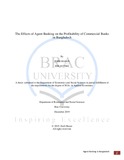The effects of agent banking on the profitability of commercial banks in Bangladesh
Abstract
The thesis examines the effects of agent banking on the profitability of commercial banks in Bangladesh. Around 1.7 billion people in the world do not have access to financial services. In Bangladesh, half of working age adults remain unbanked, of which more than 50 percent is women. Agent banking is the initial step to serve those unbanked population of Bangladesh.
The thesis has undertaken both exploratory and econometric analyses using a balanced panel dataset comprising bank level quarterly data from six commercial banks in Bangladesh which are operating full-fledged agent banking activities including both deposit mobilization and credit disbursement. The sample contains data for the period 2017Q2-2019Q2.
The exploratory analysis finds that the number of agent banking accounts for both male and female, number of agents and outlets, amount of deposits and loans and advances of agent banks have increased over the years. These indicate more unbanked people especially in the rural areas have been brought under the umbrella of banking activities. However, the exploratory analysis also reveals that deposit mobilization and credit disbursement are not balanced in agent banking. Some banks are collecting deposits/funds using their agent banking outlets but investing these funds in other areas instead of rural areas through agent banks.
The econometric analysis has been done employing a panel data regression model. Both random-effect (RE) and fixed-effect (FE) models are estimated. The Hausman specification test is performed to choose which of the models is appropriate for representing the sample data. The test result indicates the RE model is the appropriate one. The robustness check of the estimated RE model has been performed using a pooled ordinary least square (OLS) regression model. The estimated regression results show that profitability has a positive and statistically significant relationship with the amount of deposits and the number of agent banking outlets. However, credit disbursement through agents and the number of account holders do not have significant impact on the profitability perhaps due to the initial stage of agent banking in Bangladesh.
The empirical findings suggest for increased credit disbursement and deposit mobilization through agent banking outlets especially in rural areas to ensure broader financial inclusion led economic growth. More banking products should be available for the agent banking clients. Since some of the banks are using agent banking window as the source of deposit collection from
rural clients and utilize the fund for investment in urban areas, strict supervision and monitoring should be in place to ensure proper balance between deposit mobilization and credit disbursement of the agent banking so that the rural clients of agent banking units are not missing out on its benefits.

